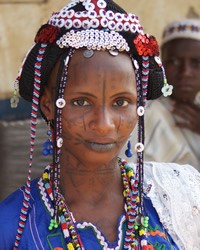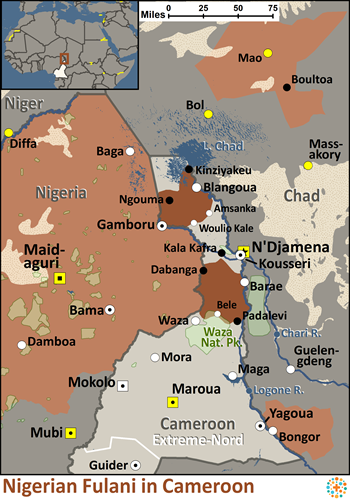Some believe that the Fulani emigrated from the Middle East or northern Africa years ago in search of new grazing land for their cattle. Today, the Fulani occupy many parts of central and western Africa. They are grouped according to location, occupation and dialect. Some of the Fulani travel with their herds, others are settled, and some mix herding with farming. Since all Fulani speak a Fulfulde dialect, this suggests that they adopted the language of the people they once conquered and continue to dominate, the Hausa of northern Nigeria. The Nigerian Fulani speak Nigerian Fulfulde. The Fulani are grouped and named according to their location, occupation and dialect of their widely spoken language. Accordingly, there are five major groups of Fulani: the Fula Toro, Fulakunda, Fulfulde, Fuuta Jalon, and Tukolor. One of the subgroups is the Nigerian Fulani. As expected, most live in Nigeria, but they are also represented in Chad, Central African Republic and Cameroon.
The semi-nomadic Nigerian Fulani people fiercely reject anything they perceive as contrary to their lifestyle, such as roaming with their cattle herds. This includes permanent homes and education; they are mostly pre-literate. They are widely regarded as troublesome by large cattle ranchers and farmers who resent having "visitations" by the cattle from nomadic people, and sometimes violent encounters. Nomadic Fulanis have been known to steal and loot, which makes the ranchers all the more suspicious. In some circumstances Nigerian Fulanis are being forced from their historic grazing land without compensation. As water becomes increasingly scarce in this part of the world, the conflicts are becoming more intense. Nigerian Fulanis lack education and health care. Most girls marry young, and their parents arrange their marriage. Polygamy is common in their communities. Within the families are households that eat at least one meal a day together. The homestead is the domestic unit, consisting of a man, his wife or wives, unmarried children, and dependent parents. Each household represents a cattle-owning entity, headed by the eldest, most able-bodied member of the family.
The Fulani peoples were among the first sub-Saharan Africans to embrace Islam. Although Nigerian Fulani are over 99 percent Muslim, their form of Islam is tainted with traditional religion or animism. Many of the politically oriented Muslim Fulani have justified their conquests on religious grounds.
People who live in a dry area with their cattle are always vulnerable to the whims of nature. Since their literacy rate is low, especially for those who live in rural areas, radio and other audio resources are an excellent medium for telling stories, which are always welcome in African cultures. Bible portions (printed audio and online), gospel recordings, the JESUS Film, and various other resources are available in their language. Medical services are a serious need.
Pray for the Lord to provide the Nigerian Fulani with abundant rain for their cattle as a testimony of his love and power. Pray for Nigerian Fulani elders to have dreams and visions that will point them to the only Savior. Pray for the Lord to thrust out workers to the Nigerian Fulani people in Cameroon. Pray for a movement to Christ among the Nigerian Fulani.
Scripture Prayers for the Fulani, Nigerian in Cameroon.
| Profile Source: Joshua Project |


























